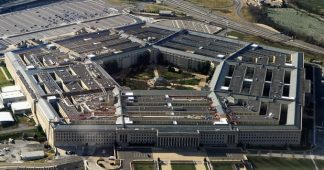Feb. 9, 2022
WASHINGTON ― Former New York City Mayor Michael Bloomberg has been named chairman of the Defense Innovation Board, which is part of the latest tranche of Pentagon advisory boards Defense Secretary Lloyd Austin is restarting.
Bloomberg, a philanthropist and cofounder of Bloomberg, served as mayor from 2002 to 2013. He succeeds Mark Sirangelo, the former head of Sierra Nevada’s space business, who was named during the Trump administration.
Defense Secretary Lloyd Austin selected Bloomberg, “to leverage his experience and strategic insights on innovation, business and public service,” Pentagon Press Secretary John Kirby told reporters Wednesday.
“His leadership will be critical to ensuring the department has access to the best and brightest minds in science, technology and innovation through the team of diverse experts that he will lead as chair of that board,” Kirby said.
Bloomberg said he aims to bring in new ideas and outside perspectives.
“Innovation and adaptability are absolutely critical at any large organization, and there is no organization bigger or more complex than the Department of Defense,” Bloomberg said in a statement. “With rapid advances in technology happening alongside rapidly evolving threats to our national security and the safety of our service members, our largest government agency must also be our most forward-thinking.”
After the Trump administration in its final days purged a number of the panels, the incoming Biden administration a year ago halted activity by all the Pentagon’s advisory panels and cleared their rosters.
In September, Austin restarted 16 defense advisory boards, and on Wednesday, he restarted the Defense Innovation Board and eight others.
“The department’s boards and committees have been and will continue to be a valuable resource as we defend the nation, take care of our people and succeed through teamwork,” Kirby said. “I know that the secretary and all our department leadership look forward to working with these advisory boards going forward.”
In December at the Reagan National Defense Forum in California, Austin said the Pentagon intends to work better with private industry to develop high-tech systems and to strengthen relations with allies in the Indo-Pacific region to maintain a competitive edge over China.
Austin said the Pentagon needs to get advances in unmanned systems, nanotechnology and artificial intelligence into the hands of U.S. forces more quickly.
The panels reinstated Wednesday include the National Security Education Board, the National Security Agency Emerging Technologies panel, the advisory board for the National Reconnaissance Office, the Army Education Advisory Committee, the Education for Seapower Advisory Board, the Board of Visitors for the Western Hemisphere Institute for Security Cooperation, the Strategic Environmental Research and Development Program Scientific Advisory Board, and the Board of Regents for the Uniformed Services University of the Health Sciences.
* Joe Gould is senior Pentagon reporter for Defense News, covering the intersection of national security policy, politics and the defense industry.
Published at www.militarytimes.com
We remind our readers that publication of articles on our site does not mean that we agree with what is written. Our policy is to publish anything which we consider of interest, so as to assist our readers in forming their opinions. Sometimes we even publish articles with which we totally disagree, since we believe it is important for our readers to be informed on as wide a spectrum of views as possible.










